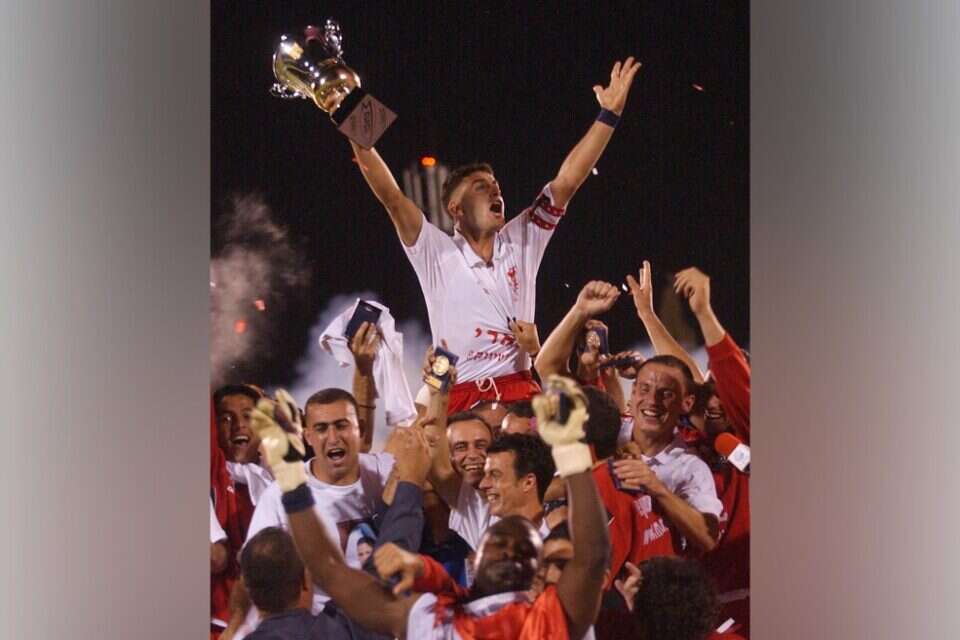Writers' travels to remote cities to tell the story of the city through the local sports team is a genre that was quite common at the beginning of the current millennium in both European and American sports literature, which of course came late after the European one.
In Israel, this genre does not exist at all, and this is due to the fact that most of the interesting sports teams are in the big cities and also because there is a significant paucity of literature dealing with sports in Israel, unless it is books that are Wikipedia rankings: the best female athlete, the major Olympic games and the albums of the World Cup in soccer.
These are excellent off-the-shelf products, but certainly not literature.
In August 2007, a few months after he was discharged from the army, Teddy Fassberg, a Jerusalemite and a staunch fan of Beitar Jerusalem, decided to give up the trip after the army and replace it with living for a year in the city of Sakhnin in the Northern District.
Sakhnin was then the hit of Israeli football: the first Arab team to win the state cup, which was followed by a hug from the masses.
She becomes a swallow that should herald a profound change in soccer and Israeli society.
It took him 15 years to process the texts that started in the blog on the website "Walla!"
into a book
In the meantime, the young student completed his doctorate and today he belongs to the department of classical studies at Tel Aviv University, and it seems that his life today has nothing to do with the guy he was then.
Why did the book come out only now?
The answers are of course many and personal, but it is enough to see the associative writing style, which is quite wild in some of the book's chapters, to understand that perhaps the appearance of the book just now is a kind of outlet for those whose lives have passed into organized writing full of boring rules and countless restrictions, courtesy of the tight-knit world of academia.
Precisely because Fassberg's book is also a historical testimony to the processes that have taken place since then in the soccer team he chose to cover, it is quite interesting.
The name of the book is as if trying to copy the Israeli mainstream - the kibbutznik is the character of the beautiful description - into the Arab society which is also becoming a part of the Israeli existence through football.
The fact that the author is a fan of Beitar Jerusalem should also add pepper to what is happening. But as a football fan, what interested me was the distance traveled and what happened to the various characters since then: for example, the young football star, Maor Bozaglo, arrived as a soldier in Sakhnin and since then had time to retire from football and become a reality star, Mazen Ganaim, the "mami" of Israeli football and society in the previous decade, became the tragic hero of the Israeli left in the recent elections when his party Ra'am was among those that overthrew the government of change and he is considered an extremist and as such "the true Arab came out of him".
Sakhnin itself has become a fait accompli in Israeli football, and its games against Beitar Jerusalem do indeed remain with explosive potential, but given the poor ability of both teams on the grass, even for another game in the Premier League.
In the past year, another group from the sector, Bnei Rayna, joined Sakhnin, but it is unable to match - Sakhnin neither in its sporting achievements nor in the interest it produces.
Sakhnin, which is described in the book as a team that unwillingly took it upon itself to represent an entire sector, has in recent years become the only team that spends almost regular time in the Israeli Premier League.
While Arab footballers have become international stars since the writer's visit to Sakhnin, the teams themselves have remained in misery and with broken dreams of qualifying for the local Premier League.
The Sakhnin case did not create any phenomenon at the group level in the Arab sector, and Sakhnin's home stadium is filled with spectators a few times throughout the game year.
It has become another badly managed team in Israeli football.
It should be said to Fassberg's credit that the book is not written in academic and distant language.
He does not believe in conclusive conclusions or developing a rigid thesis, but chooses to describe the year in Sakhnin as one full of misunderstandings and amusing experiences and above all provides a rare glimpse in Israeli sports literature behind the scenes of an Israeli soccer team (over twenty years ago Aviv Baron did this with his book "The Greens " who followed Maccabi Haifa).
This is a book that football fans will also like for its historical aspect.
In broader terms, such as the social, research, psychological and comparative aspects, there is nothing new in it, and maybe it's a good thing, because it allows you to enjoy reading it, without getting into unnecessary trouble.
Teddy Fassberg / A pile of guys on the grass; Carmel Publishing, 446 pages
were we wrong
We will fix it!
If you found an error in the article, we would appreciate it if you shared it with us








